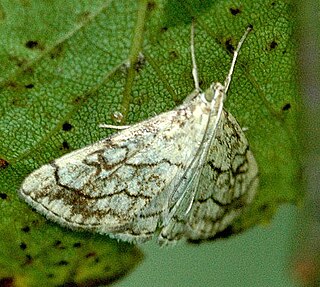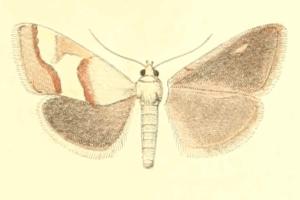
Evergestinae is a fairly small subfamily of the lepidopteran family Crambidae, the crambid snout moths. The subfamily was described by H. Marion in 1952. It contains roughly 140 species on all continents and continental islands. Evergestine moths resemble Pyraustinae; however, the male genitalia have a long uncus and long, slender gnathos. The larvae feed mostly on Brassicaceae.

Spilomelinae is a very species-rich subfamily of the lepidopteran family Crambidae, the crambid snout moths. With 4,132 described species in 340 genera worldwide, it is the most speciose group among pyraloids.

The Pyralinae are the typical subfamily of snout moths and occur essentially worldwide, in some cases aided by involuntary introduction by humans. They are rather rare in the Americas however, and their diversity in the Australian region is also limited. Altogether, this subfamily includes about 900 described species, but new ones continue to be discovered. Like many of their relatives in the superfamily Pyraloidea, the caterpillar larvae of many Pyralinae – and in some cases even the adults – have evolved the ability to use unusual foods for nutrition; a few of these can become harmful to humans as pests of stored goods.

Crambinae is a large subfamily of the lepidopteran family Crambidae, the crambid snout moths. It currently includes over 1,800 species worldwide. The larvae are root feeders or stem borers, mostly on grasses. A few species are pests of sod grasses, maize, sugar cane, rice, and other Poaceae. The monophyly of this group is supported by the structure of the tympanal organs and the phallus attached medially to the juxta.

Agrotera is a genus of snout moths in the subfamily Spilomelinae of the family Crambidae. It is the type genus of the tribe Agroterini and currently comprises 28 species distributed in the Afrotropical, Palearctic, Indomalayan and Australasian realm.
Ambia is a genus of moths of the family Crambidae.

Ancylolomia is a genus of moths of the family Crambidae described by Jacob Hübner in 1825.

Eoophyla is a genus of moths of the family Crambidae. It was erected by Charles Swinhoe in 1900.

Evergestis is a genus of moths of the family Crambidae described by Jacob Hübner in 1825. A number of species are pests, including the cross-striped cabbageworm, a pest of cole crops such as cabbage.

Haimbachia is a genus of moths of the family Crambidae.

Lineodes is a genus of snout moths of the subfamily Spilomelinae in the family Crambidae. The genus was described by Achille Guenée in 1854, with Lineodes hieroglyphalis as the type species.
Neargyria is a genus of moths of the family Crambidae.

Udea is a genus of snout moths in the subfamily Spilomelinae of the family Crambidae. The genus was erected by Achille Guenée in 1845. The currently known 214 species are present on all continents except Antarctica. About 41 species are native to Hawaii.

Neurophyseta is a genus of moths of the family Crambidae.

Lygropia is a genus of snout moths in the subfamily Spilomelinae of the family Crambidae. It currently comprises 66 species, which are mostly found in the tropical and subtropical regions of the Americas, Africa and Asia, but not in Australia.

Prionapteryx is a genus of moths of the family Crambidae.

Sufetula is a genus of moths of the family Crambidae.

Tegostoma is a genus of moths of the family Crambidae.

The Anerastiini are a tribe of moths of the family Pyralidae.
Neargyria argyraspis is a moth in the family Crambidae. It was described by Edward Meyrick in 1879. It is found in Australia, where it has been recorded from Queensland and New South Wales.












